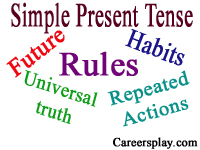Simple Present tense rules with examples:Sometimes using simple present tense is not so easy. With the help of some rules we can use simple present tense easily.
Present is used to express the following idea. These are the most common situations when we use simple present tense.
 Universal truth or facts
Universal truth or facts- To express Habitual things
- For future tense
- For repeated actions
- For imperative sentences
Let’s take a look on all these uses with the help of examples.
Simple Present tense rules with examples
Universal Truths and facts
Simple Present tense is used when we talk about the universal truth or fact.
For examples
- Water boils at 100 degree Celsius.
- Moon revolves around our earth.
- Loin kills animals to eat them.
- We come from America.
- A cow has one tail.
Habitual Activities
When we express our habits or those activates then simple present tense is used.
For examples
- Steve gets up early in the night.
- Mark goes to the library daily
- She only wants to study.
- I drink milk every day.
Repeated Actions
For actions which we repeat again and again.
For examples
- I come to office by the bus.
- Lilly sleeps late every night during the exams.
- Steve speaks only French.
- She lives in Sydney.
For future use
When we talk about any task in the future then we use simple present tense (usually when we talk about programs and timetables).
For examples
- The bus leaves at 7 a.m. from the bus stand.
- My birth day party starts at 9 p.m.
- The cricket match begins at 3 p.m.
For imperative sentences
Imperative sentences are those in which you order, request, apologies anyone. To start imperative sentences we use simple present tense.
For examples
- Obey your teachers.
- Don’t hate anyone.
- Always speak politely.
- Please give me your pen.
Few rules to use s/es / ies at the end of the verbs depending upon their nature
Verbs that end with ch, o, sh, z, x we use es in the third person.
Go-goes
Match-matches
Smash-Smashes
Kiss- kisses
Fix-fixes
Buzz-buzzes
Verbs that end with vowel + y we s in the third person
Play-plays
Stay-stays
Buy-buys
Say-says
Verbs that end with consonant + y we remove y and add ies in the third person.
Study-studies
Carry-carries
Worry-worries
Marry-marries
I hope you have enjoyed this article and get what you wanted. So these are the rules for simple present tense with examples. If you feel any problem regarding this topic then comment below so that we can solve out your problems.
Also Read
